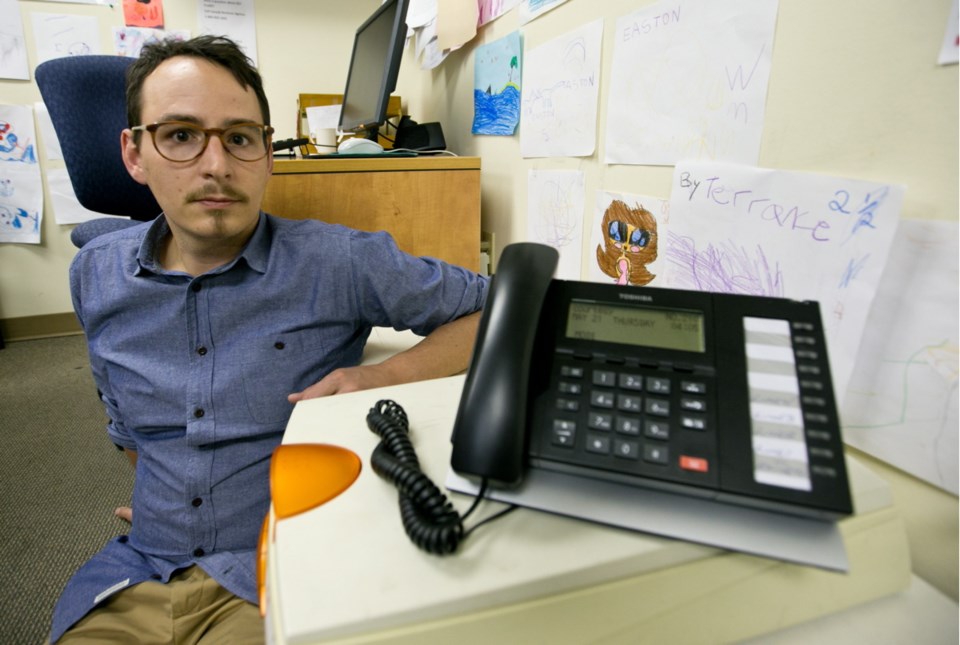B.C. expects applicants for social services to access what they need by phone or computer, when many can afford neither and lack technological and literacy skills, says a Victoria anti-poverty group.
The result is a denial of services by the Ministry of Social Development to people who need them most and are legally entitled to them, says Together Against Poverty Society and eight other anti-poverty organizations, which are calling on the B.C. Office of the Ombudsperson to investigate.
“When you have a ministry whose purpose is to serve the most challenged people in our community, that ministry has to design their services with the users in mind,” said Stephen Portman, interim executive director of TAPS.
Yet to apply for social assistance, people must use an online application that requires 90 computer page views, literacy, typing skills and Internet access, he said. If they go to the ministry office and line up to apply in person, staff will tell them to go find a computer, he said.
If they go to a public library, they would likely need to seek a librarian’s assistance for parts they don’t understand, he said.
“People have pride — it’s difficult to go sit in a public space surrounded by other people and apply for welfare,” Portman said.
A single person with no dependents receives $610 in monthly social assistance from B.C., or $906 in disability benefits.
The move toward automated phone service means applicants must deal with a different ministry staffer by phone or Internet “every single time,” Portman said. “It dehumanizes the process, for sure.”
A report released May 12 by the B.C. Public Interest Advocacy Centre on the issue found that even people with phones rely on “pay as you go” plans that frequently run out of minutes. Through a freedom of information request, the centre learned that the average caller spent 34 minutes on hold for the centralized phone line in December 2014.
Michelle Stilwell, B.C.’s minister of social development, said feedback from ministry clients indicates a growing interest in services available over the phone and online, which leaves front-line staff more time to help those who need extra assistance.
Of the 71,957 applications the ministry handled last year, fewer than 10,000 were initiated in person or over the phone. The rest were started online.
Stilwell admitted it can be challenging for many low-income individuals and families to access modern technology, and said the ministry is “always looking at ways to improve our service and ensure we’re treating people fairly and respectfully.”
She said in-person services will always be available to clients who require it.
“If people have an urgent need — no matter how they contact us — help is immediately offered. Staff will address an urgent need for food and shelter within one business day.”
But Portman said TAPS, a legal advocacy organization that helps people after they’ve been denied social services, is increasingly “overrun” with people who can’t access anyone at the ministry or get any help navigating the bureaucracy.
By 9 a.m., he said, anyone who goes to the ministry’s offices at 908 Pandora St. will be told: “Sorry, we have as many people as we’re going to see today,” and be turned away.
When those who do try to apply online are told they’re not eligible, they often give up if they have nowhere to turn for clarification, he said.
Portman would like to see the ministry set up a room with five computers and a few phones where clients can have privacy and assistance from a couple of social workers.
“If you talk to anybody who accesses services through the ministry, they’ll tell you, across the board, that accessing human-to-human support from the ministry is next to impossible,” Portman said.
“Ideally, through this report, we’d like to see a return to human-centred services where people met with a caseworker who is trying to help them get to where they want to be in their lives, instead of approaching the ministry as a wall to try and prevent them from accessing support that they need to carry on with their lives.”



